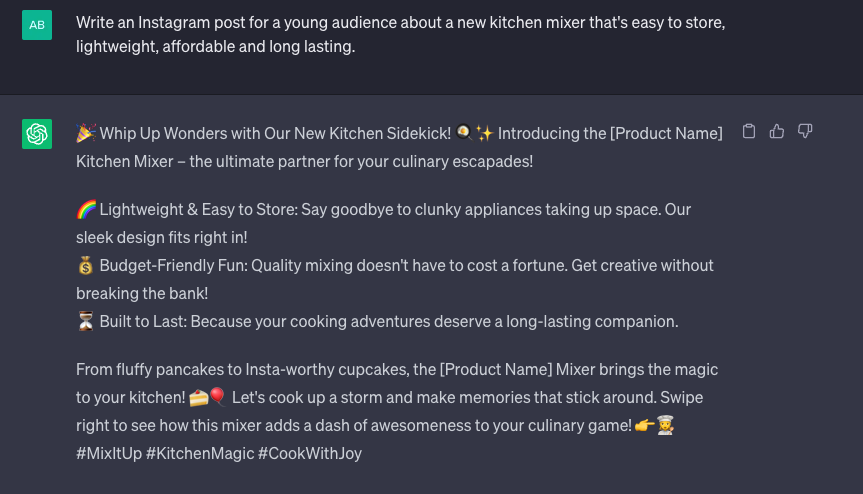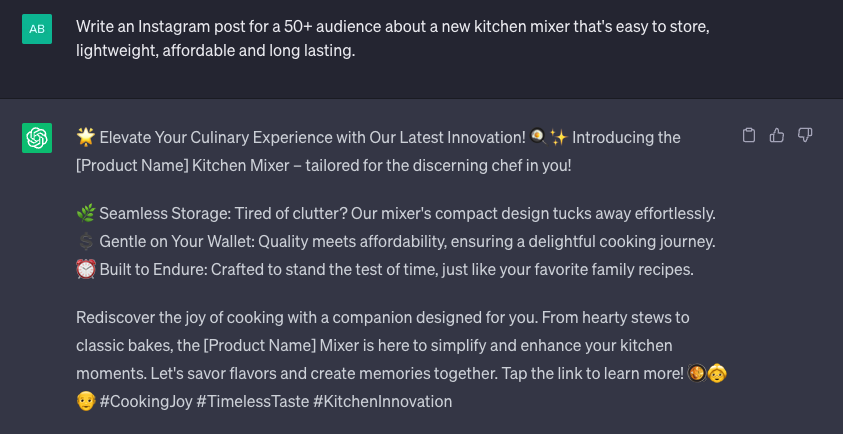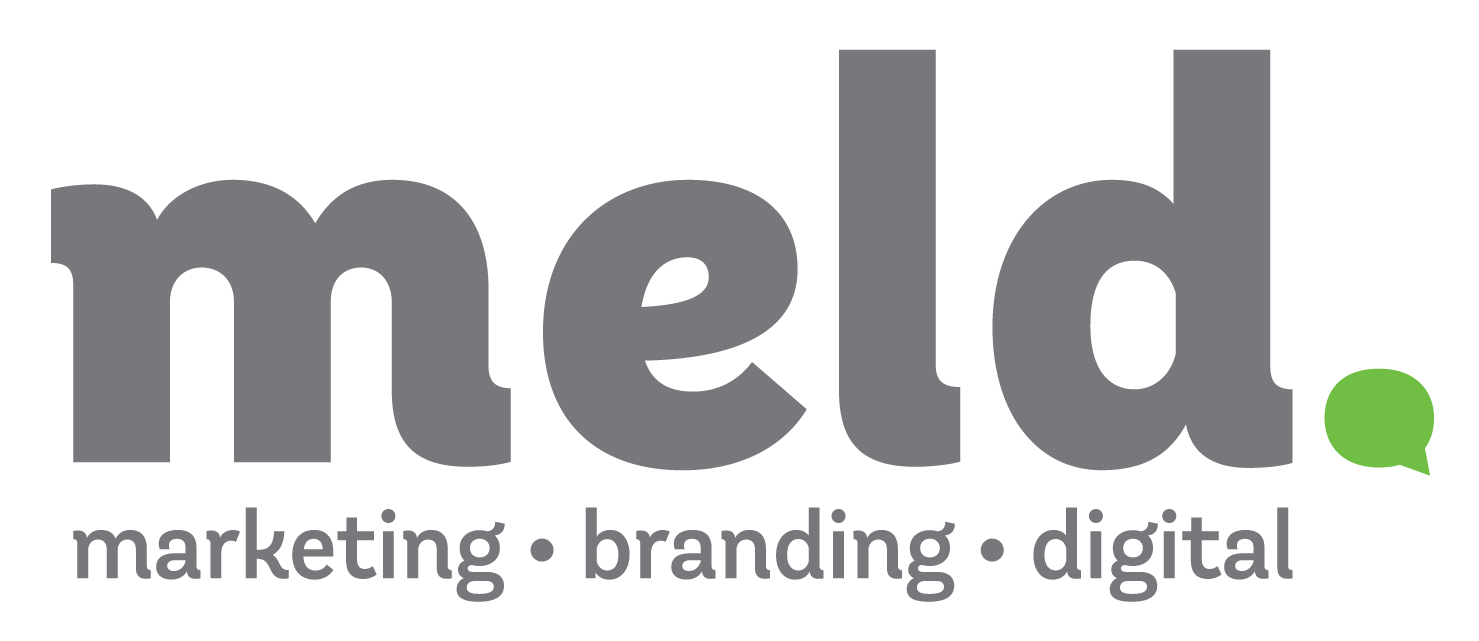Are AI Tools > Marketing Professionals?
It’s hard to escape the popularity of AI generative tools. The new tech possibilities are causing a lot of excitement, which is prompting many companies to ask, “How can we work AI into our marketing?” Some companies are even considering AI as a cheaper alternative to handle their marketing needs. While this route may seem appealing, we know relying completely on AI to implement marketing strategies and plans is problematic.
Below we’ve outlined the biggest challenges your marketing efforts would face if your company relied fully on AI—and we share our ultimate powerhouse solution for using AI. We also threw in some content prompts to put ChatGPT to the test.
What AI Lacks
1. Authenticity and Emotion
One of the secrets to marketing success is building a trusted relationship between your brand and customers. To form this relationship, it’s important to establish a brand identity and values. What does your brand stand for and what can customers expect when working with you? How do you want people to feel when they interact with your brand? While AI can be taught to reflect your brand identity and values, it can’t create them in a genuine way.
We also know customers respond better to ads that evoke human emotion. For example, when selling a kitchen mixer, an effective ad might showcase how the mixer will help consumers create delicious new recipes and how it will help families make memories while cooking together.
We gave ChatGPT a prompt to create an ad for a kitchen mixer that evoked emotion, and this is what it came up with:

Not bad, but the AI-generated copy doesn’t exactly elicit the kind of emotion that would make a consumer rush out and buy a mixer. ‘Creating memories that last a lifetime’ is a step in the right direction, but overall, the emotion feels forced and cliche.
AI can be great at presenting the surface-level benefits of a product or brand, but it doesn’t have the ability to play into or draw upon the empathic experiences that resonate with audiences and feel authentic to the brand.
2. Strategy and Creativity
With AI, the tool can only handle the single task you assign. AI doesn’t consider your overall marketing strategy or other channels that may be part of a larger campaign. Marketing campaigns are most successful when you can think big picture and make a strategic plan that connects the dots from various channels into a more comprehensive strategy.
Additionally, AI can’t deliver out-of-the-box ideas like humans can. Bots just aren’t capable of reading between the lines, making contextual connections, or suggesting and developing different creative approaches that will set your brand apart or wow your customers.
In this example, we gave ChatGPT a more specific example: Write an Instagram post for a young audience about a new kitchen mixer that’s easy to store, lightweight, affordable and long lasting. For the most part, ChatGPT delivered.

However, when we updated the audience to speak to consumers 50 and older, it got a little more interesting (note the ‘old man’ and ‘old woman’ emojis).

The bottom line: Without a true understanding of the audiences it’s writing for, ChatGPT makes its own conclusions. In this case, the assumption is that younger audiences prefer ‘culinary escapades’ and ‘Insta-worthy cupcakes,’ while older audiences are ‘discerning chefs’ having memorable ‘kitchen moments.’
3. Human Talent
While AI can be very helpful for those without a creative background who need assistance with tasks like writing or Photoshop, it still can’t produce the same quality as a talented writer or designer. Anyone who has played around with AI knows you often have to try many different renditions to get something even close to what you’re looking for.
Although AI could help your company write next month’s blog post, it lacks the personal touch a skilled (human) writer could give the same topic. When you try using AI to help you create a photo for your next promotional piece, you might end up creating people with extra body parts or a product that’s three times bigger than it should be.
The number one thing we have discovered when using AI tools is that they are only as good as the prompts and patience of the person using the tool. With ChatGPT in particular, we noticed repetition and overuse of ‘fluffy’ words and sentences.

Just for fun, we threw in a similar prompt to create ad copy for a kitchen blender.

Most consumers have been conditioned to see through overly produced, deceptive or just plain generic or ‘fluffy’ advertising content. While hyperbole isn’t new to marketing, the ‘culinary overture’ and ‘kitchen sorcery’ described in this ad copy is likely well beyond what any reasonable consumer would believe.
Is AI Useful for Marketing?
The question remains: Is it better to work with a marketing team or AI to achieve your company’s goals? The answer isn’t either/or, but rather, you should use both!
We believe the ultimate solution is working with a marketing team that has recognized the best ways to incorporate AI into their day-to-day tasks. When a skilled marketing professional is able to use AI for things like quick photo enhancements, a keyword generator, or predictive trend analysis, they’ll have more time to create strategic, impactful creative.
At Meld, we’ve decided we don’t want to fight against AI, but instead, we want to continue exploring it. When paired with the strengths and talents of a marketing team that live and breathe brands every day, AI can be a powerful marketing tool.
Stay tuned for future blog posts as we continue to discover the most effective ways to use AI to help our clients achieve their goals. If you want to chat about how we can help you in the meantime, please feel free to reach out!



